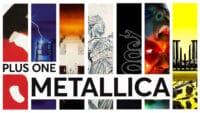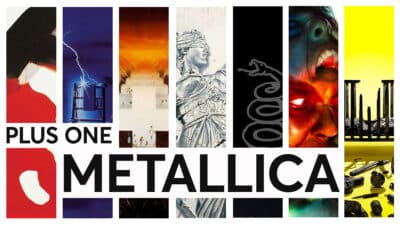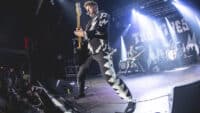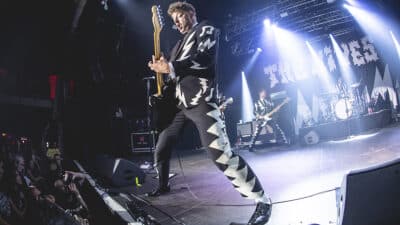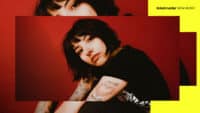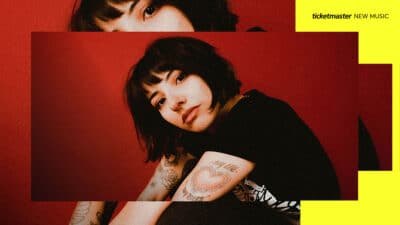Interview
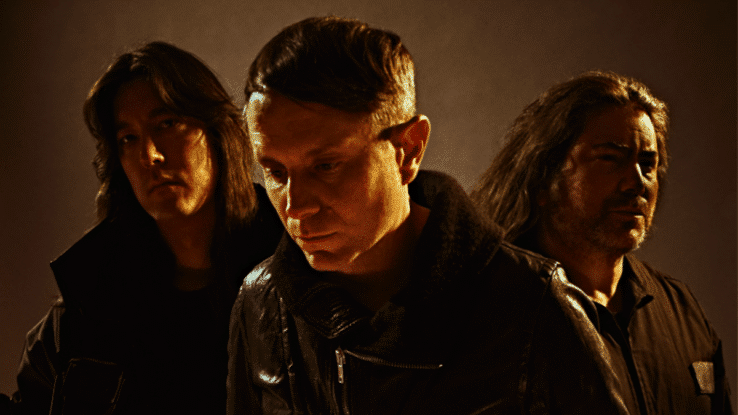
Interview
HEALTH: “We never want to fall into the trap of complacency”
John Famiglietti discusses the evolution of HEALTH and how their spirit of collaboration has never stopped opening doors
Most artists would be quick to assert that there’s no other project like theirs, but in the case of Los Angeles’ HEALTH – it’s not an exaggeration.
An industrial noise band who cross genre boundaries with every single note, when vocalist Jake Duzsik met bassist and producer John Famiglietti whilst working at LA’s flagship Guitar Center store, the only thing on their minds was becoming a part of the city’s flourishing underground scene. Fascinated by the range of musicians passing through their local venues, over the last 15 years they’ve forged a sound defined by its contradictions. Chaotic yet precise, delicate yet assaulting, each new release has challenged the limits of experimentation.
Generating a wholly unique atmosphere, as their discography has expanded, so has their live show. With drummer Benjamin Jared Miller’s driving rhythms serving as a sturdy foundation for his bandmate’s unpredictable antics, their ability to create a transformative environment onstage has set them apart from their peers. Bridging the gap between the metal, electronica, and industrial scenes, their broad scope has seen them collaborate with range of artists from The Neighbourhood and 100 gecs to Nine Inch Nails and Lamb Of God, converting thousands to their sonically disruptive cause.
Preparing for their biggest UK headline run to date this October, we spoke to Famiglietti about the project’s evolution, expanding their live show to fill larger rooms, and how the trio’s embrace of collaboration has allowed HEALTH to flourish.
It’s been over 15 years since this project first formed. When you met Jake and decided to work on something together, was there an intention for it to blossom into a full band dynamic, or was it more an outlet for experimentation?
We wanted to make a band, and that was the impetus of the project. At the time though, it was mostly about being able to join the local scene, which was based around venues like The Smell in Los Angeles. It was a very bizarre underground noise-punk scene, but something was happening, and we wanted to be a part of it immediately. We started a band, and we started touring pretty much immediately after forming. We weren’t planning on still being here after all this time, but apparently it happens!
Coming up in the underground LA scene, how much of an impact did your surroundings have on the sound HEALTH have forged over the years?
We’ve changed a lot now, but it was a huge influence in the beginning. Music is composed in the space it’s going to be played in, and our early material was made to be played on the floors of DIY venues, and in basements and warehouses. We started writing different music to be played on bigger stages as the band and the venues grew. Our environment has dictated the story of the band, for sure.
Your 2015 album, DEATH MAGIC, marked a turning point for your sound – incorporating more melodic elements than in your previous projects. Why did you feel drawn to taking the project in that direction?
Well, we were always so out of our mind with the music we were writing when we were younger. So many obvious thoughts were not occurring to us, but around 2010, we started noticing all this new electronic music coming out. It was such a quantum leap from what came before it in terms of the level of power, so we knew we needed to modernise our sound and take it to the next level. With everything that was happening in music, we needed to find a way to do that in our own language and make it good. It was a long, fraught process, and there were versions of DEATH MAGIC that were 60% complete that we trashed. We finally got it done in 2015, and a new era of HEALTH was born.
It harks back to the punk mentality of not wanting to sell out but wanting to do something bigger nonetheless. How do you find that balance when you’re accustomed to writing in a more abstract way?
It’s weird because we’re always thinking about that kind of stuff, but a lot of things are accidental. I was not an electronic producer before writing this stuff, but as you work on things you start to do things naturally. We work in a song format, and we’re still a rock band, but the process changes. We’re still doing our old experimental sound, but we’re trying to use the electronics within that rock sound. You start hitting all these weird challenges whilst putting these sounds together, and the universes are so different. We’re thinking about it a lot, and you’re never fully sure. We’re always like, ‘Is this bad? Who’s this for? What are we even doing?’… This could be a disaster!
We have a backwards way of making music, and when we see other people make music, they don’t seem to have these struggles. They just write stuff, and that’s it. That must be wonderful! Our whole journey has been full of conceptual thinking, and all these things coming from the wrong entrance. I guess that’s what makes the music what it is, but it’s always a struggle.
Collaboration has become such a huge part of this project over the years – especially when we look at an album like DISCO4. As creatives, what are the perks of joining forces with your peers?
We think about it a lot, and collaboration really helped us to lighten up. You have to relinquish so much control, especially because these people are busy. I can’t tell them, ‘Do it again’, because they have countless other things to be working on. If they give me a piece of music, that’s what we’re working with. I’m not going to reproduce it, because then it won’t sound like them. You can’t completely control it, so you’re only going to work with people that you respect to get the song done and make it as good as possible. There are often lots of limitations, like sometimes they can’t physically be there, so it’s just done via email. It’s a challenge, but it has really let us loosen up and release a lot more music than before.
Coming into 2023’s RAT WARS then after working on DISCO4, what was the vision for that album?
Seeing where we’ve been going with music, and the collaborations that have opened up, we were looking at the fans and the shows. We wanted to make the perfect encapsulation of that, but we were also focused on where we were going to take our sound and what influences we would draw from. I see every album as having the same foundation, but we’re adding different sounds and gimmicks to each one. We’re remaking a similar album, and this one’s new gimmicks were arpeggios, synthesisers, funk influences, and 90s industrial. We’re adding to the toolbox again, and because of that, RAT WARS is darker. We add all these things to what we already do, and that becomes the album’s statement.
The band’s sound is often geared around the feelings you’re able to provoke in your audience. Growing up, were you drawn to artists who could create unique sonic atmospheres?
I was super into albums. Downloading came out when we were young, so you could get hold of everything that you wanted. You could get a PhD in rock ‘n’ roll pretty easily! I had tons of classic albums at my disposal, but we also love film scores. What was great about creating RAT WARS was that we had an audience, so it was easier to consider how to capture them. With DEATH MAGIC, we were making an album with a big vision, but we had no idea who it was for. Now, we really know our new fans, and we were making a record for them specifically. It made it much easier to focus, because you’re making it from a position of strength. You don’t have to worry about whether people are going to like it.
When you were working on RAT WARS then, did you put much thought into how the record would come across in a live setting?
Definitely. There are songs on the album that we knew would work better as live songs. We only ever end up playing a few songs from each album live, and for that reason we always speed up and change songs a little bit. With all the new material we’re writing now, we’re focused on getting some higher tempos in there. We’re playing bigger shows, so let’s get some sh*t for these big stages and big festivals.
Having been adjusting the live aspect of this project for over a decade and a half now, how has HEALTH’s live show evolved?
Honestly for us, it’s kind of the same. If you watch footage of us playing in a living room in the 2000s, we’re still going just as bananas, because we’ve always really cared about the live show. Now though, the production is so much bigger. We’re working with some of the best, and we’re carrying in big racks of lights that we could never have had back in the day. That’s my favourite thing about playing big venues, you can really make a show a show.
A lot has changed over the last few years, obviously within the wider world, but within the heavy music scene too. From your perspective, does it feel as though the genre has become more open to experimentation and sounds that challenge the norm?
It’s only quite recently that we’re coming into this zone, because we came from a totally different scene before. Luckily, everyone’s been very welcoming. When we were first coming into the rock scene though, people thought the genre was f*cked. Everyone was saying that there was going to be no new festival headliners to come out of the genre, but now the conversation has totally changed. There are new bands in this heavy space that are getting f*cking huge, and that was not the case even just five years ago.
We’re line-steppers, but honestly, I think that the idea of genre is a good thing. I like bands being in a section of the record store that makes sense, but we are a strange bird. What’s so great about the heavy scene is that it has its own culture, so it’s not just a case of opening the borders. If you’re going to blur the lines, you have to at least be speaking their language. You can get a little fruity with the pop stuff, but it still has to have that foundation. I like the way it’s working because it’s keeping its identity. 10 years from now, metal festivals won’t be completely unrecognisable, but they’ll be more varied that’s for sure.
There are artists who now credit HEALTH as an inspiration, and fans who thank your music for helping them through tough times. Did you ever anticipate that the songs you create would hold such special places in people’s lives?
Definitely not. When someone tells you that, it’s crazy. Our fans are very heartfelt, and that’s so special. We’re writing music for them, and we really do get them. We owe a lot to them, and we are writing this emotional music specifically for them.
What’s special about HEALTH is that all three of you are clearly huge fans of not only music, but your music. Everything you create has that spirit behind it. How vital is it for artists to remain excited about the things they create?
Often bands get shittier over time, but I think often that comes when artists stop listening to current music. Over time, if you stop paying attention to what’s happening, it will degrade your music. Caring about the current moment and climate you’re making the music in is very important, but it’s not necessary. We never want to fall into the trap of complacency.
HEALTH tour Birmingham, Manchester, Glasgow, Liverpool and London this October. Find tickets here





